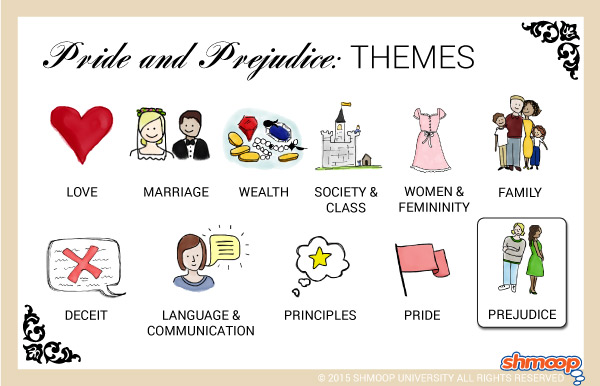 (Click the themes infographic to download.)
(Click the themes infographic to download.)
Let's get something straight: Pride and Prejudice has nothing to do with racial prejudice. (If you want to read about that, Shmoop has plenty of options.) Jane Austen is a white lady talking almost exclusively about white ladies. (Love ya, Jane!) But all forms of prejudice are based on the same principle: you pre-judge somebody based on one most likely irrelevant fact, and you refuse to change your opinion based on actual, observable fact. It's the opposite of rational, liberal-minded thinking—and we don't mean liberal in any political sense. We mean liberal in the way Austen (and other writers of her time) used it: open-minded, willing to change your ideas, and interested in facts rather than opinions. You know—exactly the opposite of prejudiced.
Questions About Prejudice
- Which characters are prejudiced? What kind of prejudices do they have?
- Occasionally Austen uses "prejudiced" when it seems like actual good sense—like when she says that knowing Darcy separated her and Bingley would "prejudice" her against him, even though that actually sounds like a pretty good reaction to finding out that your brother-in-law tried to break you up. Why does Austen use that word here? Does "prejudiced" not have a fixed meaning?
- Are there any acceptable prejudices in Pride and Prejudice? We've suggested that "liberal" is Austen's antonym for "prejudiced"; does that seem right? Can you think of others?
Chew on This
In Pride and Prejudice, prejudice is a worse sin than pride.
Austen associates prejudice with vulgarity. No matter how wealthy or how high-ranked someone is, prejudice lowers a person's character.